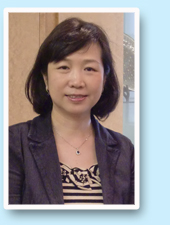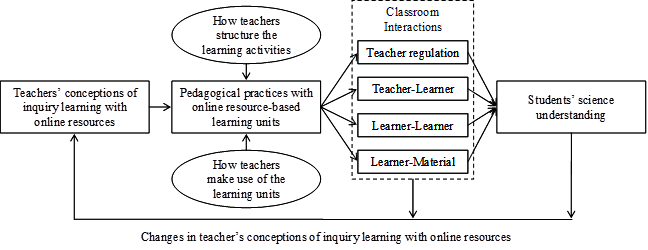 |
 |
| |
Selected Research Project |
| |
 |
| Project Title |
Online Resource-based Inquiry Learning Environment: Effects of Teacher Pedagogical Practices on Science Understanding of Primary Learners Working in Groups |
|
| |
| Principal Investigator |
Professor So Wing Mui, Winnie |
|
| |
| Area of Research Project |
Teaching and Learning |
|
|
|
|
| |
| Project Period |
|
|
| Objectives |
-
To explore teacher conceptions regarding inquiry learning with online resources;
-
To identify the types of classroom interactions associated with different pedagogical practices in inquiry learning; and
-
To investigate the effects of teacher pedagogical practices on the science understanding of learners.
|
|
|
| Methods Used |
- Teacher survey: Teachers’ conceptions in teaching and learning with online resources
- Teacher pre- and post-lesson interviews: Teachers’ views towards the online resource-based learning environments
- Student survey: Students’ motivation and cognitive engagement
- Student pre- and post-lesson tests: Students’ understanding of science concepts
- Student interviews: Students’ learning processes and the difficulties encountered
- Teaching designs analysis: Use of contexts, resources, tools and scaffolds
- Lesson observations: Teachers’ teaching behaviour
|
|---|
| Conceptual Framework |
|
|
| Summary of Findings |
- Teachers’ conceptions of inquiry learning with online resources were rather general with mean values of most responses around the mid-point value of the 4-point Likert scale
- The teachers who had more misconceptions about inquiry learning found it more difficult to implement
- The teachers who found it more difficult to implement inquiry learning tended to place more emphasis on the importance of selection criteria for online resources and were more resistant in using online resources
- Teachers needed help to overcome misconceptions of inquiry learning through effective and practical continuing professional development programmes
- Teachers needed support in finding, selecting and using online resources for teaching purposes.
- The RBeLEs framework was useful in guiding the teachers to design lessons with online resources by making them more aware of the how online resources should be used to enhance student learning
- Looking for suitable online resources particularly those in Chinese or Cantonese was not easy
- The students found learning with online resources in groups an enjoyable experience
- Significant improvements in student learning of science concepts was found
- ICT literacy of the students needed to be increased so that they could learn with online resources effectively
- Depending on the nature of the topics and learning materials as well as the characteristics and needs of the students, the teachers used a combination of the following interaction patterns: teacher instruction, teacher explanation, teacher-student interaction, student-student interaction, student-class interaction, individual work, and others
|
Impact |
- Introduction of the Resource-Based e-Learning Environments (RBeLEs) framework
- Development of innovative inquiry learning activities involving the use of online resources
- Deeper understanding of teachers’ conceptions of inquiry learning with online resources
- Contribution to literature on inquiry learning, e-learning, resource-based learning and learning environments.
|
Selected Publications Related to the Study |
- So, W. M. W. (2012). Creating a framework of resource-based e-learning environment for science learning in primary classrooms. Technology, Pedagogy and Education, 21(3), 317-335.
- So, W. M. W., & Ching, N. Y. F. (2011). Pupil Science Learning in Resource-Based e-Learning Environments. Journal of Computers in Mathematics and Science Teaching, 30(2), 203-223.
- So, W. M. W., Cheng, M. H. M., Kong, S. C., & Ching, N. Y. F. (2012). Views of primary science teachers towards the use of online resources to support the implementation of inquiry learning. Education 3-13.
- Ching, N. Y. F., & So, W. M. W. (2012). Teaching and learning animal classification with e-resources: A tale of two classrooms. The International Journal of Science in Society, 3(3), 107-116.
- So, W. W. M., & Ching, F. N. Y. (2013). Online resource-based learning environment: Case studies in primary classrooms. Asia-Pacific Forum on Science Learning and Teaching, 13(2), Article 10.
- So, W. W. M., Ching, F. N. Y., Kong, S. C., & Cheng, M. M. H. (2011). Teacher’s selection and use of Internet-based resources and tools to facilitate learning in primary classrooms. In A. Mendez-Vilas (Ed.), Education in a technological world: Communicating current and emerging research and technological efforts (pp.440-447). Badajoz, Spain: Formatex Research Center.
- So, W. W. M., & Ching, F. N. Y. (under preparation). A Study of the Internet Resource Based e-Learning Environments In Hong Kong: Animal Classification in a Primary School. In M. S. Khine (Ed.), Science education in East Asia: Pedagogical innovations and best practices.
|
| Biography of Principal Investigator |
|
Prof. So has been working in science teacher education since the 1990s. She is currently a Professor and Head in the Department of Science and Environmental Studies, Director of the Centre for Education in Environmental Sustainability, as well as the Associate Dean of the Graduate School. She has rich experience in teaching undergraduate, postgraduate diploma, Master of Education, Doctor of Education and PhD programmes, in the areas of Science Education, General Studies and Liberal Studies.
Prof. So’s main research areas are: inquiry learning in science and environmental education, integrating Information Technology and teacher development in Science/ General Studies/ Liberal Studies. She has been the principal investigator of various research projects funded by the General Research Fund, Quality Education Fund and the Education Bureau. Prof. So has books and multimedia publications on science learning, science investigations and project learning. She is now on the editorial board of the South African Journal of Education and the Asia-Pacific Forum on Science Learning and Teaching, and as reviewer for several international journals.
Internationally, she is now the President of the Asia Pacific Educational research Association (APERA), a serving executive member of the World Education Research Association (WERA) and the East Asian Science Education Association (EASE). She has rich experience in organizing/hosting various educational and science education conference, including the Asia Pacific Educational Conference 2014, the Global Chinese Conference on Science Education as well as the East Asia in science Education.
Locally, she has been appointed member of the Humanities and Social Science Panel of the Research Grants Council of Hong Kong since 2010, the member of the steering committee of the TIMSS since 2013, member of the Assessment Working Group of the Chief Executive’s Award for Teaching Excellence (2012/2013), member of the Science Museum Advisory panel since 2014, member of the Food Wise Hong Kong Steering Committee (2014-2015) and member of the Advisory Committee of the Hong Kong Academy for Gifted Education since 2014. She has been serving as a member of the Curriculum Development Council since the 2000s (Science Education and Liberal Studies since 2010 and General Studies in the 2000s). She has also contributed to school management of local schools. Prof. So has been the executive member of the Hong Kong Educational Research Association for more than 10 years. She is also the convenor of a large scale inter-school event “Innovative Science and Environment Studies” since 1998. |
Funding Source |
General Research Fund |
|
|
|
 |
|
 |






